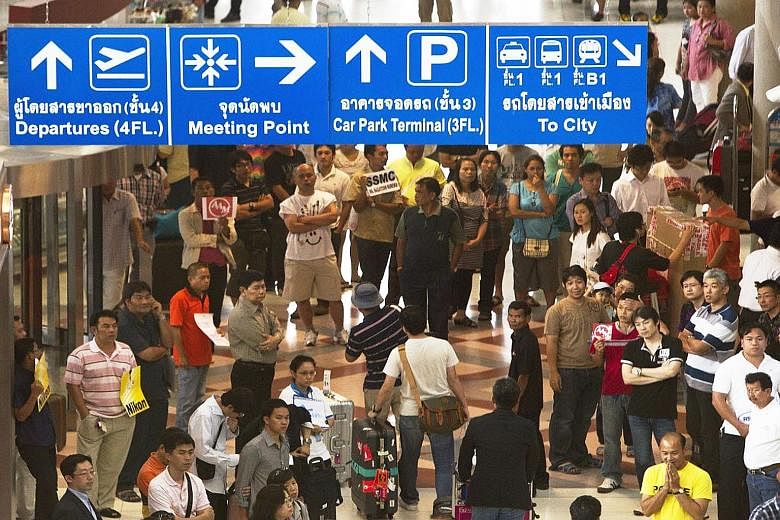Ballooning numbers of air travellers are putting the strain on Thailand's biggest airport as its managers crack their heads over how to cope with the crowds before new facilities are completed in four years' time.
Suvarnabhumi Airport, situated just outside Bangkok, has a capacity of 45 million passengers a year. But in the 12 months to September, it handled 52 million passengers - about two million shy of Changi Airport's 2014 figure. The numbers are set to climb further amid Thailand's tourism boom.
Demand for boarding gates is so intense that airlines are increasingly being forced to park their planes in remote bays and use buses to ferry their passengers there. This is delaying connections, say airline managers.
Maintenance crew are scurrying to keep up with the increased wear and tear on infrastructure like runways, and check-in queues are spilling over into public access areas during peak hours.
Harried airline operators made a startling call last month to ban new flights at the airport.
Mr Louis Moser, chairman of Thailand's Airline Operators Committee, told the Bangkok Post then that the "authorities should come to their senses".
He softened his stance when contacted by The Straits Times on Thursday, but maintained that the addition of new flights should be limited until airport expansion plans are realised.
"You are putting a lot of pressure on the people. You are putting pressure on the staff and putting pressure on the passengers," he said.
Suvarnabhumi was built in 2006 to replace Don Muang Airport in northern Bangkok. Yet the regional boom in air travel meant that it was handling more passengers than its capacity within five years of its opening. To cope, the government re-opened the decommissioned Don Muang in 2012, and enticed budget carriers like AirAsia to relocate there.
Meanwhile, repeated delays in the expansion of Suvarnabhumi allowed the growth in passenger traffic to outpace that of facilities. In July last year, shortly after the military coup, the ruling junta ordered a review of the plans.
Various developments are back on track - an extra runway, two new terminals, as well as an expansion of the current terminal.
All of that will add at least 35 million passengers to its annual capacity, but the first components will not be ready until 2019.
But banning new flights is out of the question, said Mr Siroj Duangrat, director of Suvarnabhumi International Airport.
"When more airlines come to Thailand, it creates economic growth," he told The Straits Times. "The airport cannot become the barrier to economic growth just because of its limitation."
To deal with the crowds, the airport management has rearranged check-in counters, set up more self-check-in kiosks and opened a centre to speed up baggage handling. It has also proposed increasing plane parking fees to discourage airlines from hogging space.
Mr Moser thinks there is a limit to how far these tweaks can go.
"It's like you have a five-bedroom apartment and you have 50 people coming in," he said. "You are renovating the kitchen to turn it into a bedroom and adding more bunks to the room."
The biggest priority, say airline operators, should be expanding the airport as fast as possible to match Bangkok's pull as one of the world's top tourist destinations.
Tourism is a bright spot in Thailand's economy, helping to push third-quarter growth to 1 per cent despite sagging exports and high household debt.
Tourist arrivals from July to September hit 7.3 million, almost a quarter more than in the same period last year.
"Suvarnabhumi is the tourism gateway to Thailand," Mr Brian Sinclair-Thompson, Swiss International Airlines' station manager in Bangkok, told The Straits Times. "If we don't have a gateway that functions and adapts to demand, it will have big knock-on problems.
"It will affect the wider hospitality industry."

